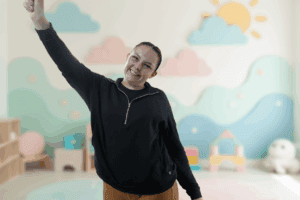Handle bed-wetting challenges better with these easy tips.

Although bed-wetting is common, it is not often spoken about openly due to feelings of embarrassment. Research shows that up to 25% of children at the age of 4, and an estimated 10% between 4 and 15 years, experience bed-wetting.
Dr Michael Mol, medical doctor and brand ambassador for DryNites Pyjama Pants, debunks the most common myths below. This is in the hopes of helping parents support their children affected by bed-wetting.
Myth 1: Bed-wetting is caused by drinking fluids before bedtime
This is not true. The medical term for bed-wetting is Nocturnal Enuresis. It is summarised as the involuntary discharge of urine after the age at which bladder control should have been established. The word to take note of is involuntary, which means that your child does not know that they are wetting the bed.
It is suggested that you limit their intake of sugary or caffeinated drinks hours before bedtime. But, they should always be allowed to drink water as this doesn’t affect whether or not they wet the bed.
Myth 2: If your child is properly toilet-trained, they shouldn’t be wetting the bed
Urine control during the day is completely different to what goes on when your child is sleeping. Your child could be a star bathroom goer while awake, but it is nobody’s fault if they wet the bed while asleep.
Myth 3: Children wet the bed when they are lazy to go to the bathroom
This is false, and if believed, could lead parents to blame their children for wetting the bed. This will in turn exacerbate the problem. These are the most common problems associated with bed-wetting:
• Delay in bladder reflex development. This means that your child’s bladder is not signalling the brain to wake up.
• Their body may not be producing enough anti-diuretic hormone. This slows down urine production at night, so we don’t have to wake up as much.
• A delay in bladder development can result in lower bladder capacity.
Myth 4: Punishing your child for wetting the bed will help their progress
Remember that your child has no control over the situation, and probably feels bad about it. Being punished for something that they can’t help will only cause their self-esteem to decrease and stress to increase.
Many parents go the opposite way and try star charts or reward systems for dry nights. But, understanding the problem goes a long way in terms of maintaining your child’s confidence levels.
Myth 5: Waking your child in the middle of the night for a bathroom visit will end bed-wetting
This is often referred to as “lifting”, and can seem like a good strategy if it helps to keep the sheets dry. The reality is that this will not improve your child’s bladder control. Instead, it could frustrate them, especially if they don’t need to urinate when you wake them up.
If your child is over the age of five, it may also cause them to feel discouraged. This will have a negative effect on their self-esteem.
Brought to you by Bona Magazine






